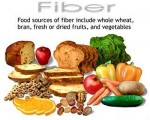 High-fiber diets during early adult years may lower lifetime cardiovascular disease risk
High-fiber diets during early adult years may lower lifetime cardiovascular disease risk
A new study from Northwestern Medicine shows a high-fiber diet could be a critical heart-healthy lifestyle change young and middle-aged adults can make. The study found adults between 20 and 59 years old with the highest fiber intake had a significantly lower estimated lifetime risk for cardiovascular disease compared to those with the lowest fiber intake. This is the first known study to show the influence of fiber consumption on the lifetime risk for cardiovascular disease.
“It’s long been known that high-fiber diets can help people lose weight, lower cholesterol and improve hypertension,” said Donald M. Lloyd-Jones, M.D., corresponding author of the study and chair of the department of preventive medicine at Northwestern University Feinberg School of Medicine. “The results of this study make a lot of sense because weight, cholesterol and hypertension are major determinants of your long-term risk for cardiovascular disease.”
A high-fiber diet falls into the American Heart Association’s recommendation of 25 grams of dietary fiber or more a day. Lloyd-Jones said you should strive to get this daily fiber intake from whole foods, not processed fiber bars, supplements and drinks.
“A processed food may be high in fiber, but it also tends to be pretty high in sodium and likely higher in calories than an apple, for example, which provides the same amount of fiber,” Lloyd-Jones said.
For the study, Hongyan Ning, M.D., lead author and a statistical analyst in the department of preventive medicine at Feinberg, examined data from the National Health and Nutrition Examination Survey, a nationally representative sample of about 11,000 adults. Ning considered diet, blood pressure, total cholesterol, smoking status and history of diabetes in survey participants and then used a formula to predict lifetime risk for cardiovascular disease.
“The results are pretty amazing,” Ning said. “Younger (20 to 39 years) and middle-aged (40 to 59 years) adults with the highest fiber intake, compared to those with the lowest fiber intake, showed a statistically significant lower lifetime risk for cardiovascular disease.” In adults 60 to 79 years, dietary fiber intake was not significantly associated with a reduction in lifetime risk of cardiovascular disease. It’s possible that the beneficial effect of dietary fiber may require a long period of time to achieve, and older adults may have already developed significant risk for heart disease before starting a high-fiber diet, Ning said.
As for young and middle-aged adults, now is the time to start making fiber a big part of your daily diet, Ning said.
Erin White is the broadcast editor. Contact her at ewhite@northwestern.edu

Comments